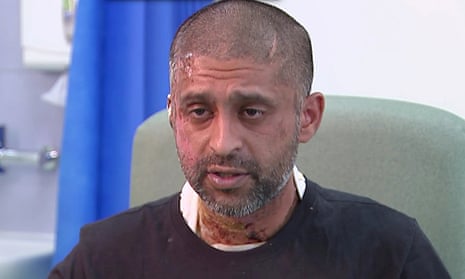It is difficult to imagine a more vicious way of causing someone harm than throwing acid in their face. Designed not only to maim, but to disfigure, it is an act that is beyond the comprehension of most of us.
In recent days, there have been multiple reports of acid attacks on people of south Asian origin in east London, though not all have been substantiated. As yet, only one has been classified as a hate crime: the attack on Resham Khan and Jameel Mukhtar, who were sprayed with acid while sitting in traffic last week. Somewhat surprisingly for such a savage crime – particularly given that it is being treated as a hate crime – it has received only limited media coverage. And when Mukhtar suggested in an interview that it would have been treated differently if the situation had been reversed – if the perpetrator had been Muslim and the victims white – it was hard not to think very carefully about whether he had a point.
But please don’t mistake this as a sign of paranoia on my part. I do not believe all non-Muslims are out to get us. I do not believe that danger lurks around every corner. Every day I see people commit acts of generosity and kindness that cross barriers and underscore our common humanity. If the appalling spate of recent terror attacks has done anything, it has shown how we, as citizens, rally when our communities are hurt.
The point Mukhtar is making, perhaps, is that the media has to speak for us all: it has to tell stories that affect all of us. That’s a tricky task, and it’s one reason many minorities – of whatever persuasion – read the media that focuses on the group with which they most identify. It makes sense that someone who identifies as LGBT might read Pink News, or that a Jewish person might pay special attention to the Jewish Chronicle. The presence of strong community newspapers and periodicals is a good thing. Such publications allow people to gain a deeper understanding of the issues affecting their particular community; they allow them to maintain links with the people and places they feel a connection to. They are vital in enabling us to have a sense of belonging.
But it isn’t the sole responsibility of publications aimed at minority groups to report on the issues affecting those groups. I would not expect the murder of a trans person to be reported only in the LGBT press. Similarly, I would consider it unacceptable if the reporting of an antisemitic crime were restricted to the Jewish press. The mainstream media has a duty to report incidents such as these, because failing to do so implies that the harm caused by them is of no consequence. In reality, of course, the consequences of hate crimes are profound.
The mainstream media has to be for us all. All our voices have to be heard. All our stories have to be given the legitimacy they deserve.
Admittedly, that’s a big ask. But then, that’s the point of the press: to tell us the stories that we would not otherwise hear. And it’s difficult to discuss this topic without raising the ever-present issue of representation. For it makes sense that journalists would take a particular interest in the stories they can relate to, and that they might work, particularly early on in their careers, for outlets with a specific focus on demographics they can identify with. But when we have a media that is still dominated by middle-class white people, many of whom went to public school and then to elite universities, we need to ask serious questions about whose stories are privileged and whose are seen as unworthy.
There are myriad reasons that only 0.4% of British journalists are Muslim; a multitude of factors behind the – pitifully low – statistic that only 0.2% are black. But, minorities or not, we exist. And we have a right to be treated as equals. And since there aren’t enough of us in journalism to tell our own stories in a way that does them justice, it is the job of those people privileged enough to hold such positions to provide the space for our voices to be heard.

